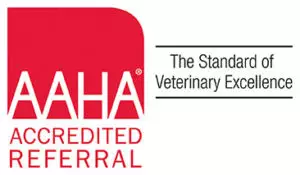Holiday Pet Safety in Plainview
However you choose to celebrate the holidays this season, make holiday pet safety one of your top priorities to prevent an unexpected trip to the animal hospital! For veterinarians, the issue of a pet eating something they shouldn’t and then getting seriously sick is universal, especially around the holidays. To prevent a stressful experience for yourself and your four-legged best friend, review our holiday pet safety tips below.
Harmful Holiday Foods
It wouldn’t be the holidays without the appropriate eats! Here are some of the most common foods your pet should NOT be getting their paws on:
Chocolate
Whether it’s white chocolate, milk chocolate, or 70% cocoa with cayenne pepper, your pet should not being eating it. Chocolate contains stimulants, including caffeine and theobromine, which can cause irregular heart rhythm, muscle tremors, and possibly even seizures. Baking chocolate is also very high in cocoa and stimulants that can harm your pet, so use it wisely.
Hard candy/candy canes
Hard candy is a choking hazard for dogs and cats, and if it comes in a wrapper, the wrapper can cause choking as well. Keep candy dishes up high or anywhere else out of your pet’s reach.
Xylitol
Xylitol is a sugar substitute you’re likely to find in sugar-free candy and gum and sugar-free baked goods. If ingested, xylitol can dramatically lower your pet’s blood sugar and cause liver failure on top of that.
Bones
Why shouldn’t you let your pet chew on a meat bone? There are several reasons: First, bones can chip teeth. Second, they can cause injury to the inside of the mouth, the throat, and the intestine. Third, a swallowed bone can end up blocking the throat or bowels, which can be fatal if the bone is not removed.
Decorative Dangers
A home isn’t warm and festive without holiday decorations. Unfortunately, some decorations can be harmful to your pet! These include:
Tinsel
If your pet swallows a strand or two of tinsel, they could choke or suffer from an obstruction or, at the very least, get it caught in their teeth. In a worst-case scenario, a piece of tinsel may cause crimping of the intestine or get wound around a section of the organ and require emergency surgery. Be very careful about using tinsel to decorate your tree.
The Christmas tree
Your tree might be a tempting target for your pet. To reduce the chances of it getting knocked over, place the tree in a corner or other low-traffic area and make sure it’s placed in a sturdy tree stand. Make sure the tree water is covered by the tree skirt, and always shoo your pet away from the tree if they get too close or try to drink the tree water, which can be highly toxic (especially to cats). Vacuum up any pine needles scattered on the floor, as these can hurt your pet’s feet or cause illness if ingested.
Mistletoe, Jerusalem cherry, holly, and Poinsettias
These popular holiday plants are beautiful to look at, but if eaten, they can make your pet very sick. Poinsettias may cause minor stomach upset but aren’t overly dangerous, but the berries from mistletoe, holly, and Jerusalem cherry are very poisonous to both pets and humans.
If you suspect any kind of toxicity in your pet, you can contact us or reach out to the Pet Poison Helpline for more information.


